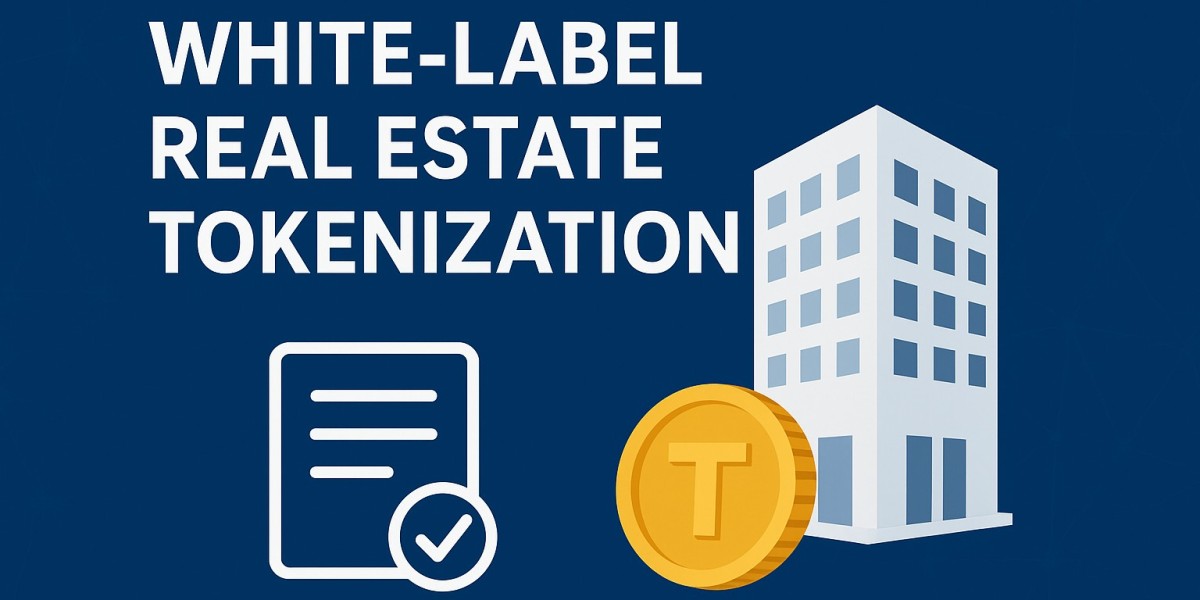The real estate industry, once known for its rigid structures and traditional investment models, is undergoing a transformative revolution in 2025 thanks to blockchain technology. Real estate tokenization has emerged as a powerful innovation that is redefining property ownership, investment accessibility, and liquidity. By converting physical assets like land, commercial properties, and luxury estates into digital tokens on a blockchain, investors can now buy, sell, and trade real estate assets more efficiently than ever before. This evolution not only democratizes access to real estate investment but also introduces a new level of transparency, automation, and global reach.
In 2025, blockchain-powered tokenization platforms are leading the shift toward decentralized ownership, creating opportunities for both investors and property developers. This blog explores how blockchain is fueling real estate tokenization, the benefits it brings, the underlying mechanisms, and the impact it will continue to have on the industry in the years to come.
Understanding Real Estate Tokenization
Real estate tokenization is the process of converting ownership rights of a property into blockchain-based digital tokens. These tokens represent fractional ownership of a property, allowing multiple investors to own shares of the same real estate asset. For instance, a $10 million commercial building can be divided into one million tokens worth $10 each, making investment more accessible to a broader audience.
The tokens are issued through smart contracts self-executing agreements stored on a blockchain that automate compliance, revenue distribution, and transfer of ownership. This digital representation of property assets simplifies transactions, eliminates intermediaries, and enhances liquidity. As a result, real estate tokenization bridges the gap between traditional property investment and decentralized finance (DeFi).
The Role of Blockchain in Real Estate Tokenization
Blockchain serves as the foundational infrastructure that enables secure, transparent, and efficient real estate tokenization. Its decentralized ledger ensures that every transaction related to property ownership, token issuance, or transfer is permanently recorded and verifiable. Unlike traditional property transactions that rely on central authorities, blockchain allows peer-to-peer interactions governed by smart contracts, reducing human error and fraud.
Moreover, blockchain ensures immutability once a transaction is recorded, it cannot be altered. This feature provides unparalleled transparency in tracking property histories, ownership changes, and financial flows. In 2025, leading blockchain networks such as Ethereum, Polygon, Avalanche, and Binance Smart Chain are being used for tokenized real estate projects due to their scalability, security, and interoperability.
How Blockchain Simplifies Property Ownership and Investment
Traditional real estate ownership involves extensive paperwork, middlemen, and legal complexities that make it difficult for small investors to participate. Blockchain simplifies this process by digitizing ownership and enabling fractional investment through tokenization.
When a property is tokenized, ownership details are stored on the blockchain. Investors can purchase these tokens just like buying stocks in a company. This approach reduces entry barriers, allowing individuals to invest in high-value real estate properties without needing large capital. Investors can diversify their portfolios across multiple properties globally while maintaining complete transparency over their holdings.
Additionally, blockchain-based platforms facilitate secondary market trading, allowing investors to sell their tokens anytime instead of waiting years for property appreciation or sales. This new liquidity model marks one of the biggest shifts in real estate investment history.
Smart Contracts: The Backbone of Tokenized Real Estate
Smart contracts are the driving force behind blockchain-based real estate tokenization. These are self-executing digital agreements coded with predefined rules and conditions that automatically execute once criteria are met. For instance, when an investor purchases tokens representing ownership in a property, a smart contract automatically updates the blockchain ledger and issues the tokens to the investor’s digital wallet.
Smart contracts also handle revenue distribution. Rental income, property appreciation gains, or dividends can be automatically split among token holders based on their share percentage. This automation eliminates the need for intermediaries such as escrow agents or financial administrators, significantly reducing operational costs and human errors.
In 2025, smart contracts are also ensuring compliance with jurisdictional regulations, KYC (Know Your Customer), and AML (Anti-Money Laundering) standards, making tokenized real estate platforms more secure and legally compliant.
Enhanced Liquidity Through Tokenization
Liquidity has long been one of the biggest challenges in traditional real estate investment. Properties often take months or years to sell, limiting investor flexibility. Blockchain addresses this issue by enabling fractional ownership and secondary market trading.
Tokenized assets can be traded on blockchain-based marketplaces similar to stock exchanges. Investors can buy or sell their property-backed tokens at any time, improving liquidity and financial freedom. This approach makes real estate a more dynamic investment class and attracts global investors seeking flexible opportunities.
Moreover, tokenized real estate can be integrated into decentralized finance (DeFi) ecosystems. Investors can use their property-backed tokens as collateral for loans, participate in yield farming, or trade across decentralized exchanges (DEXs). These capabilities further enhance the liquidity and utility of tokenized assets in 2025.
Transparency and Security in Property Transactions
Transparency is one of the defining features of blockchain technology, and it plays a crucial role in real estate tokenization. All property-related information ownership records, transaction history, and valuation details can be securely stored and accessed on a public ledger. This eliminates the risks of fraudulent listings, duplicate ownership, or hidden legal claims.
Blockchain also enhances security through cryptographic encryption. Every transaction is verified by multiple network participants (nodes), ensuring data integrity and preventing tampering. This decentralized verification model removes the need for centralized authorities, reducing risks associated with corruption or manipulation.
In 2025, tokenized real estate projects are using blockchain not only to secure transactions but also to build investor confidence by providing complete transparency in every aspect of asset management.
Global Accessibility and Fractional Investment Opportunities
Real estate has historically been a local investment market, limited by geography and large financial requirements. Blockchain-powered tokenization changes this dynamic by enabling global participation. Anyone with internet access and a digital wallet can invest in tokenized real estate assets across the world.
Fractional investment allows investors to buy smaller portions of high-value assets, diversifying their holdings and minimizing risk exposure. This democratization of investment opportunities benefits both retail and institutional investors. For developers and property owners, it opens new avenues for raising capital through global token offerings without the complexities of traditional financing.
In 2025, this accessibility has resulted in the emergence of global real estate token marketplaces, connecting investors from different countries and creating new liquidity pools in the property sector.
Regulatory Compliance and Legal Frameworks
One of the major advancements in 2025 has been the evolution of regulatory frameworks supporting real estate tokenization. Governments and financial authorities have begun recognizing tokenized assets as legitimate financial instruments, creating clear guidelines for compliance and investor protection.
Blockchain’s traceability helps ensure adherence to KYC and AML regulations. Smart contracts can be programmed to restrict token transfers only to verified investors or within compliant jurisdictions. This built-in regulatory compliance feature simplifies legal oversight and reduces the risk of violations.
Tokenization platforms are also collaborating with legal experts to establish standardized frameworks for property registration, ownership validation, and dispute resolution, paving the way for wider institutional adoption.
Lower Costs and Faster Transactions
Traditional property transactions involve multiple intermediaries brokers, banks, legal agents, and government authorities each charging service fees and extending the transaction timeline. Blockchain eliminates the need for many of these middlemen through automation and peer-to-peer systems.
Smart contracts instantly execute agreements, reducing paperwork and administrative delays. The cost of transactions drops significantly because blockchain-based platforms charge minimal processing fees compared to traditional banking and legal systems.
In 2025, blockchain-enabled real estate tokenization has reduced transaction times from weeks to minutes, allowing near-instant ownership transfer and payment settlement. This efficiency not only benefits investors but also improves the overall speed of real estate markets.
Integration with Decentralized Finance (DeFi)
One of the most exciting developments in 2025 is the convergence of real estate tokenization with decentralized finance. DeFi platforms allow token holders to use their real estate-backed assets in innovative financial ecosystems.
For example, investors can use tokenized real estate as collateral to secure crypto loans, stake tokens to earn yields, or participate in liquidity pools. This integration transforms real estate from a static investment into an active, income-generating asset class.
Furthermore, DeFi-powered lending models enable property developers to raise funds through decentralized mechanisms, bypassing traditional banks. These models not only improve capital efficiency but also ensure transparency and investor trust.
Institutional Adoption and Market Growth
Institutional investors are now embracing tokenized real estate as part of their diversified portfolios. The transparency, security, and liquidity offered by blockchain align with institutional requirements for asset management.
In 2025, several real estate investment trusts (REITs) and property management firms have adopted blockchain solutions to tokenize large commercial and residential assets. This institutional participation is fueling the growth of global tokenization markets, attracting billions in digital property investments.
Additionally, tokenized real estate funds are emerging as a preferred vehicle for managing multi-property investments, giving investors access to curated portfolios of blockchain-verified assets.
Case Studies: Real Estate Tokenization in Action
Numerous successful projects highlight the real-world potential of blockchain-powered tokenization. For instance, luxury hotels and commercial properties in Dubai, New York, and Singapore have been tokenized and offered to investors globally through blockchain platforms.
These projects have demonstrated the feasibility of fractional ownership models and showcased how blockchain can streamline property management and revenue sharing. Real estate developers are also leveraging tokenization to raise funds efficiently for new construction projects, creating new investment models for global participation.
As adoption continues to rise in 2025, we can expect more cities to embrace tokenized infrastructure projects and property-backed securities.
Challenges in Real Estate Tokenization
Despite its transformative potential, real estate tokenization faces several challenges. Regulatory uncertainty remains a concern in certain regions where tokenized assets lack legal recognition. Additionally, integrating blockchain systems with traditional real estate registries requires significant technical and legal collaboration.
Scalability and interoperability are also key issues. With multiple blockchains supporting tokenization, ensuring seamless asset transfer across networks remains complex. Moreover, investor education is critical—many potential participants are still unaware of how tokenization works or how to securely manage digital assets.
However, ongoing innovation in blockchain technology and supportive policy developments are gradually overcoming these challenges, paving the way for mass adoption.
Future of Real Estate Tokenization in 2025 and Beyond
The future of real estate lies in tokenization powered by blockchain. As the technology matures, we can expect greater regulatory clarity, advanced smart contract functionalities, and increased interoperability across blockchains.
Artificial intelligence (AI) and the Internet of Things (IoT) are also expected to integrate with blockchain to enhance property valuation, maintenance, and predictive analytics. Together, these innovations will create a fully digital and automated real estate ecosystem.
By 2030, experts predict that a significant portion of global real estate transactions will be conducted via tokenization platforms, making property ownership as simple and secure as buying digital stocks.
Conclusion
In 2025, blockchain stands as the cornerstone of real estate tokenization, revolutionizing how properties are owned, traded, and managed. It has brought transparency, liquidity, and global accessibility to an industry that has long been bound by geographical and financial constraints.
By enabling fractional ownership, automating transactions through smart contracts, and fostering global investment participation, blockchain is democratizing real estate investment for individuals and institutions alike. Although challenges remain, the momentum toward a tokenized real estate economy is unstoppable.
As blockchain continues to evolve, its impact on real estate will only deepen ushering in a new era where property ownership is digital, decentralized, and accessible to all.








